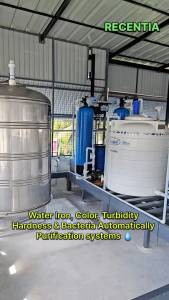Description
Ground Water Iron: Understanding and Managing This Common Water Problem
Ground water often contains dissolved iron, a naturally occurring element that can significantly impact water quality and overall health. This product description outlines the characteristics, consequences, and solutions related to high levels of iron in groundwater.
What is Groundwater Iron?
Iron in groundwater exists primarily in two forms: ferrous iron (Fe2+) and ferric iron (Fe3+). Ferrous iron is soluble and colorless, often found in anaerobic (oxygen-free) groundwater. When exposed to oxygen (e.g., upon contact with air), it oxidizes to ferric iron, which is insoluble and precipitates out as a reddish-brown sludge. This oxidation is responsible for the staining and other problems associated with high iron levels.
Consequences of High Iron in Groundwater:
- Aesthetic Issues: The most noticeable effect is the staining of plumbing fixtures, laundry, and even teeth with reddish-brown discoloration. Water may appear cloudy or have a metallic taste.
- Plumbing Problems: Iron deposits can clog pipes, reducing water flow and potentially damaging appliances like water heaters and washing machines. This leads to increased maintenance costs and reduced lifespan of equipment.
- Health Concerns: While generally not acutely toxic at levels typically found in groundwater, high iron concentrations can contribute to digestive issues in some individuals. Furthermore, iron bacteria can thrive in high-iron environments, leading to unpleasant odors and potential health implications.
- Taste and Odor: High iron levels often impart a metallic taste and unpleasant odor to the water, making it unpalatable for drinking and cooking.
Types of Iron in Groundwater:
- Dissolved Iron: This is the iron that is dissolved in the water, invisible to the naked eye until it oxidizes. This requires specialized testing and treatment.
- Particulate Iron: This is iron that is suspended in the water as sediment, often visible as rust or other discoloration. It's usually easier to remove than dissolved iron.
- Iron Bacteria: These bacteria use iron as a food source, exacerbating the problem by increasing the amount of iron and creating unpleasant odors and slime buildup.
Testing for Groundwater Iron:
Accurate testing is crucial for determining the level of iron in your water and selecting the appropriate treatment method. Use a reliable water testing kit or laboratory service specifically designed for iron detection. The results will typically be expressed in parts per million (ppm) or milligrams per liter (mg/L).
Solutions for Removing Iron from Groundwater:
Several effective methods exist for removing iron from groundwater, including:
- Oxidation and Filtration: This is a common and effective method that involves adding oxygen to the water to oxidize ferrous iron to ferric iron, followed by filtration to remove the insoluble precipitate. Methods include aeration, chlorine injection, and potassium permanganate oxidation. Filtration systems can range from simple sediment filters to more complex multi-stage systems.
- Reverse Osmosis (RO): RO systems effectively remove iron and other contaminants by forcing water through a semi-permeable membrane. They are effective but can be more expensive and produce wastewater.
- Ion Exchange: This method uses resin beads to exchange iron ions with other ions, effectively removing iron from the water.
- Water Softeners: While primarily designed for removing hardness minerals, some water softeners can also remove some iron. However, this might not be effective for high iron concentrations or specific types of iron.
Choosing the Right Solution:
The best solution for removing iron from your groundwater depends on several factors, including the concentration of iron, the presence of other contaminants, your budget, and water usage. Consulting with a water treatment professional is highly recommended to determine the most effective and cost-efficient approach for your specific situation. They can analyze your water, recommend appropriate treatment systems, and assist with installation and maintenance.
